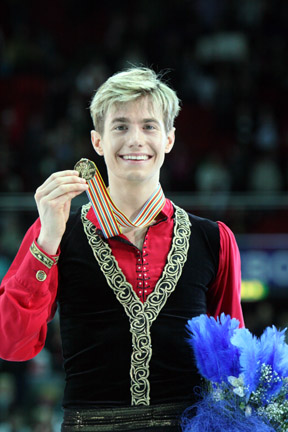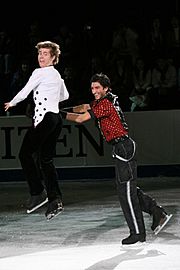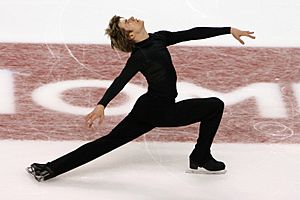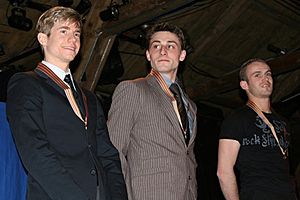Jeffrey Buttle facts for kids
Quick facts for kids Jeffrey Buttle |
|
|---|---|

Buttle on the podium at the 2008 World Championships
|
|
| Personal information | |
| Country represented | |
| Born | September 1, 1982 Smooth Rock Falls, Ontario, Canada |
| Home town | Barrie, Ontario, Canada |
| Height | 1.73 m (5 ft 8 in) |
| Retired | September 10, 2008 |
Jeffrey Buttle (born September 1, 1982) is a Canadian figure skater and choreographer. He won a bronze medal at the 2006 Winter Olympics. He also became the World champion in 2008. Buttle was the Four Continents champion in 2002 and 2004. He also won the Canadian championship three times, from 2005 to 2007. In 2008, he was the first Canadian man since 1997 to win a World Title. He stopped competing in figure skating on September 10, 2008.
Contents
About Jeffrey Buttle
Jeffrey Buttle was born in Smooth Rock Falls, Ontario, Canada. He grew up in Sudbury. During his skating career, he lived in Barrie, Ontario.
He went to a French-language elementary school. Even though his family is not French-Canadian, Jeffrey learned French as a child. He can speak both English and French. He also studied chemical engineering at the University of Toronto for a while. He later took a break to focus on his skating.
Jeffrey's Skating Journey
Jeffrey Buttle started skating when he was only two years old. He began competing at age six. He even took ballet classes to help him improve his skating skills. Jeffrey also competed in ice dancing with his older sister, Meghan. He trained at the Mariposa School of Skating in Barrie, Ontario.
Early Skating Years
Jeffrey won a silver medal at the junior level at the Canadian Championships in 1998. The next year, he competed in his first senior national competition. He quickly moved up in the skating world.
He started competing internationally as a senior skater in the 2001–2002 season. He immediately won a silver medal at the 2001 NHK Trophy. At the Canadian Championships, Jeffrey earned a bronze medal. This allowed him to go to Korea for the Four Continents competition, where he won his first gold medal.
Jeffrey's bronze medal at the Canadian Nationals was not enough for him to join the Canadian 2002 Olympic figure skating team. However, he still went to the 2002 Worlds. He placed high enough to help Canada earn two spots for the next World Championships.
The next season, Jeffrey won another medal at the Nationals. However, he could not win the Four Continents title again. In the 2003–2004 season, he worked hard to improve. He won his first Grand Prix gold medal at the 2003 NHK Trophy. He then won a silver medal at 2003 Skate Canada. Jeffrey qualified for the Grand Prix Final, but he had to withdraw.
After that, he had a tough time at the Nationals. He did not get a spot for the Worlds. Instead, Jeffrey was sent to the Four Continents, which he won for the second time. That summer, he trained in Lake Arrowhead with Rafael Arutyunyan.
Jeffrey had a great 2004–2005 season. He qualified for the Grand Prix Final again and won a silver medal. He then won his first National title. He finished the year by winning a silver medal at the 2005 Worlds.
Reaching Senior Success

In the 2005–2006 Olympic season, Jeffrey won the 2005 Trophée Eric Bompard. He came in second at the 2005 Skate Canada. He had a small problem at Skate Canada when his pants ripped during his performance! With a gold and a silver medal, he qualified for the 2005–2006 Grand Prix Final. He won his second silver medal in a row at that competition. He then won his second National title at the 2006 Canadian Championships. He went into the Olympics as the current World silver medalist.
At the Olympics, Jeffrey was in sixth place after his short program. Two days later, during his free skate, he fell on a quad toe jump. He also put a hand down on the ice after a triple Axel jump. Despite these small errors, he scored his personal best in the free skate. He placed second in that part of the competition and third overall. This earned Canada its first bronze medal in men's figure skating since 1976. Jeffrey later said that he stopped thinking about winning a medal and just focused on enjoying his free skate. This helped him perform better.
After the Olympics, Jeffrey competed at the 2006 Worlds in Calgary. He placed sixth.
Jeffrey had to miss the 2006 Grand Prix series because of a back injury. He started his season at the 2007 Canadian Championships. There, he won his third national title in a row. After Nationals, Jeffrey went to the 2007 Four Continents in Colorado. He was leading after the short program. He became the first male skater to get the highest level (level fours) on all his spins and footwork under the new scoring system. In his free skate, he made some mistakes, which led him to win the silver medal.
Jeffrey then competed at the 2007 Worlds. He was second after the short program with a new personal best score. He placed eighth in the free skate, finishing sixth overall. His performance helped Canada earn two spots for the 2008 World Championships.
For the 2007–2008 season, Jeffrey started slowly. He placed third and fourth at his two Grand Prix events. He decided to use his short program from the previous season again. At the 2008 Canadian Championships, he was in the lead after the short program. However, he ended up losing his title to a rising star, Patrick Chan. At the 2008 Four Continents, Jeffrey placed third in the short program. He then placed second in the long program, winning the silver medal.
At the 2008 Worlds, Jeffrey placed first in the short program. He then gave his best performance ever to win the gold medal. He won by a large margin over the defending world champion, Brian Joubert from France. After winning Worlds, Jeffrey appeared on many TV shows.
Jeffrey was supposed to compete in the 2008 Skate Canada and 2008 Cup of China events. He prepared new programs for the 2008–2009 season. However, he announced his retirement from competitive skating on September 10, 2008. He said he had achieved his goals in skating and no longer felt the desire to compete. He represented the Sudbury Skating Club throughout his career.
Skate Canada published a book about Jeffrey Buttle in December 2008. Another book about him was published in Japan in 2009. Jeffrey also served on the Skate Canada Officials Advisory Committee.
Jeffrey was the Athlete Ambassador for the 2010 and 2011 Canadian Nationals. On November 15, 2012, Skate Canada announced he would be added to the Skate Canada Hall of Fame. The ceremony happened during the 2016 Canadian Figure Skating Championships. He performed a special program called "Both Sides, Now" at the event.
After Competing
Jeffrey Buttle has performed with Canadian Stars on Ice since his competitive days. He continues to skate in shows as a professional skater. He has performed in shows in the US, China, Japan, Korea, and Europe. He has kept his skating skills sharp by taking part in professional-amateur competitions in Japan for many years.
Besides skating, Jeffrey also works as a choreographer. This is a career he started after he stopped competing. He became interested in choreography after watching David Wilson create skating programs. Wilson was Jeffrey's main choreographer since 1999. Jeffrey admired Wilson's passion for choreography. Jeffrey now works as a choreographer at the Toronto Cricket, Skating and Curling Club. He has choreographed programs for many famous skaters from different countries.
Jeffrey has also choreographed group performances for shows like Stars on Ice, Holiday Festival on Ice, The ICE, and Fantasy on Ice. He was part of the choreography team for the Canadian TV show Battle of the Blades. He also choreographed for Intimissimi on Ice – OPERAPOP 2014.
Jeffrey Buttle became the director of Stars on Ice for the 2017 tour. He continues to work as a choreographer and performer.
Images for kids
 | John T. Biggers |
 | Thomas Blackshear |
 | Mark Bradford |
 | Beverly Buchanan |




